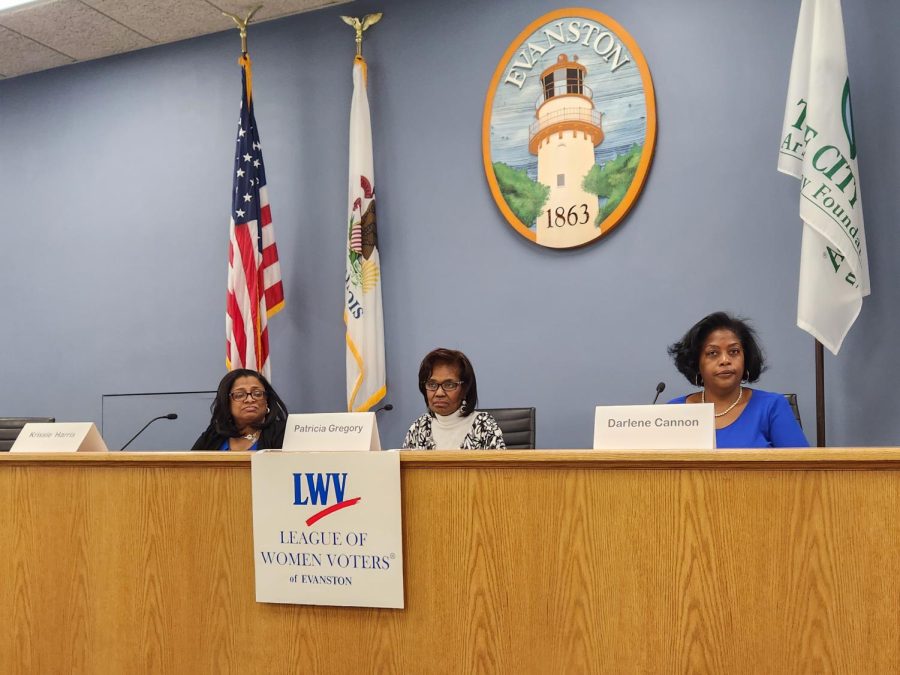City Council candidates say Rebuild Ryan Field project hinges on public opinion as Ryan Family, NU-affiliated campaign contributions roll in
William Tong/The Daily Northwestern
Left to right: Ald. Krissie Harris (2nd) and challengers for the 2nd Ward councilmember seat Patricia Gregory and Darlene Cannon at the Feb. 18 League of Women Voters Evanston candidate forum. As NU and Ryan Family affiliate money entered the races, candidates agree city approval for Rebuild Ryan Field depends on community input.
March 30, 2023
Following Northwestern-affiliated campaign donations to 2nd and 9th Ward City Council incumbents, all candidates say they would prioritize listening to resident feedback when considering how to proceed with Northwestern’s Rebuild Ryan Field project.
The University announced plans to rebuild the stadium in September following a $480 million donation from the Patrick and Shirley Ryan Family. To proceed, the University needs a special use permit for the stadium’s construction, a zoning text amendment to permit full-capacity concerts and a liquor license from the city.
Ald. Krissie Harris (2nd) received $12,000 in campaign donations on March 12 and 13 from a member of the Ryan family and a former employee of Ryan Specialty Group — an insurance firm owned by the Ryans — according to data from the Illinois State Board of Elections.
Harris said she’s returned this money, as well as another $6,000 donation that the Board’s website does not show her campaign having reported yet. She said she was surprised by the three donations because of their size, though her team did not immediately check for where they originated, she added.
Donations will not affect how she views or votes on the Ryan Field project, Harris said.
The large donations from Ryan family affiliates are troubling to some residents regardless of whether Harris accepted them, said Lesley Williams, a 7th Ward resident and president of Community Alliance for Better Government.
“This just seemed like a different level of outsider influence, so people were angry — people were shocked,” Williams said. “It’s important for Harris to acknowledge that concern on behalf of the community.”
Aside from the three $6,000 donations, more than 70% of Harris’ reported campaign contributions come from individuals who attended, worked for or acted as consultants for the University.
Harris said she does not solicit donations.
“Not everyone from Northwestern is in alliance with this projected stadium,” Harris said. “I’m getting money from across the board — from people who believe what I’m saying.”
Ald. Juan Geracaris (9th) — who is running against 9th Ward resident Kathy Hayes — said because he is an employee of NU’s Kellogg School of Management, he plans to recuse himself from any vote regarding the stadium. Residents he’s spoken with are mostly concerned about concerts at the stadium, he added.
According to the State Board of Elections, Geracaris’ campaign has received $4,500 total this cycle.
“It’s hard to reach people,” Geracaris said. “I don’t come from a political background, so I don’t have organizations that are necessarily helping me out.”
Harris said she wants to hear feedback from as many residents as possible and let Ald. Eleanor Revelle (7th) lead the discussion, since the stadium is located in the 7th Ward.
She said she’s heard people who support and oppose many facets of the project, including the proposed concerts.
“We tend to hear the loudest residents, but there are many residents weighing in,” she said. “I’ve heard across the board.”
The other two candidates for 2nd Ward — Equity and Empowerment Commission Member Darlene Cannon and Evanston/Skokie School District 65 teacher Patricia Gregory — have not raised as much money for their campaigns as Harris.
Gregory is self-funding her campaign, she added, and the Board does not show her receiving any campaign donations.
“Funding my campaign is up to me because I’m the one that’s running,” Gregory said. “I don’t want to put anybody in an uncomfortable position … This campaign seems like it’s getting a little nasty, and I just want to step back.”
Gregory said she wants to canvass more ward residents about Ryan Field.
According to the State Board of Elections, Cannon received at least $1,784 in campaign contributions this election cycle.
Cannon said the proposed concerts at the stadium concern her the most.
“Is having 35,000 seat concerts in a residential area really best for this community?” Cannon said. “It shouldn’t begin with — they shouldn’t be asking about zoning.”
Still, Cannon said, how the project proceeds as a whole still depends on community feedback.
Hayes said Ryan Field is a “hot button issue” the city needs to address, though not the only one that deserves attention. She said City Council can use Ryan Field as a starting point for discussing other ways for NU to invest in Evanston. Her campaign reported receiving $1,190, according to the State Board of Elections.
She said the city and its residents shouldn’t treat NU as an adversary in the process. So far, discussion about Ryan Field included a “heightened level of argument,” Hayes said.
“I think Northwestern is quite capable of having a community agreement that ensures … safety, security, investment and help with small business or education,” Hayes said. “If we flourish as a community, Northwestern will flourish as a university.”
Evanston’s 2023 consolidated election takes place April 4.
Shannon Tyler contributed reporting.
Email: [email protected]
Twitter: @william2tong
Related Stories:
— The Daily Explains: 2023 Local Elections
— Amid skepticism about NU Ryan Field studies, Evanston seeks independent information
— ‘Respect Evanston’: Community members express distrust in NU’s Ryan Field rebuild at town hall












